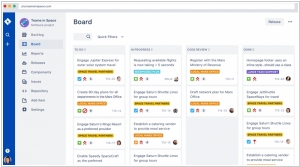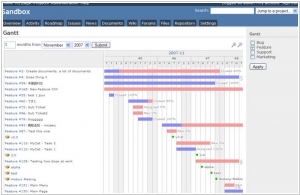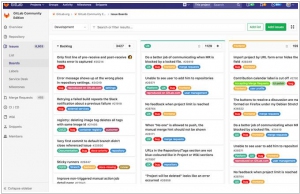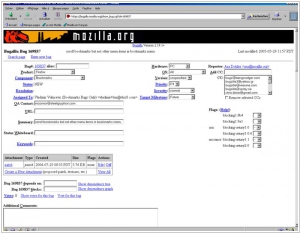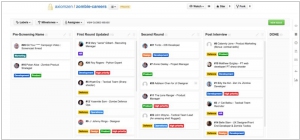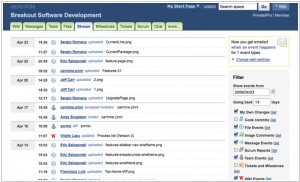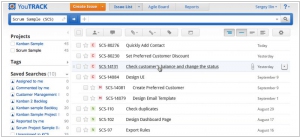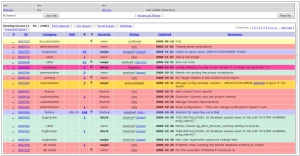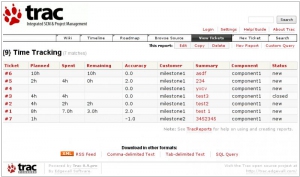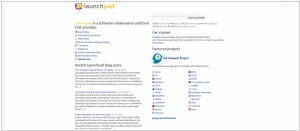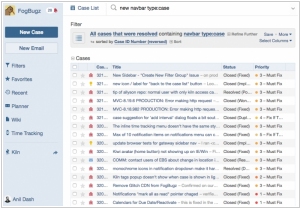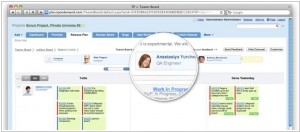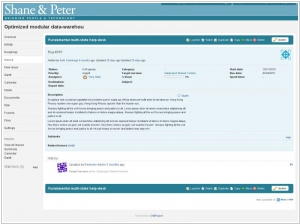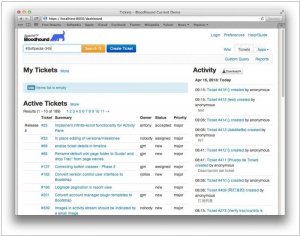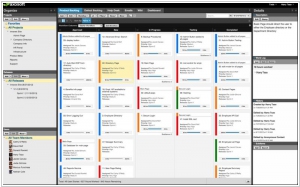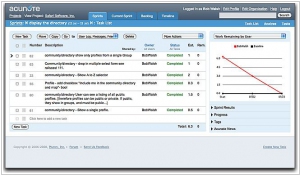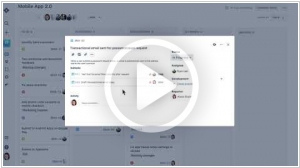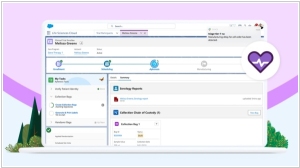Top 10 Issue and Bug Trackers
February 03, 2024 | Editor: Michael Stromann
23
Issue tracking systems allow to manage and maintain lists of issues, as needed by an organization and used by customer support departments and software development teams to create, update, and resolve reported customer issues, or even issues reported by that organization's other employees.
1
JIRA provides issue tracking and project tracking for software development teams to improve code quality and the speed of development. Combining a clean, fast interface for capturing and organising issues with customisable workflows, OpenSocial dashboards and a pluggable integration framework, JIRA is the perfect fit at the centre of your development team.
2
Redmine is a flexible alternative project management web application. Written using the Ruby on Rails framework, it is cross-platform and cross-database. Redmine is open source and released under the terms of the GNU General Public License v2 (GPL).
3
GitLab offers git repository management, code reviews, issue tracking, activity feeds and wiki’s. Enterprises install GitLab on-premise and connect it with LDAP and Active Directory servers for secure authentication and authorization. A single GitLab server can handle more than 25,000 users but it is also possible to create a high availability setup with a multiple active servers.
4
Bugzilla is server software designed to help you manage software development. Bugzilla is a "Defect Tracking System" or "Bug-Tracking System". Defect Tracking Systems allow individual or groups of developers to keep track of outstanding bugs in their product effectively. Most alternative defect-tracking software vendors charge enormous licensing fees. Despite being "free", Bugzilla has many features its expensive counterparts lack. Consequently, Bugzilla has quickly become a favorite of thousands of organizations across the globe.
5
Agile Project Management inside GitHub. ZenHub is more than “integrated”: it runs natively in GitHub’s interface. Stop context switching with third-party tools and unite your team where they already work: GitHub.
6
Assembla workspaces allow to accelerate software teams. Ticketing and issue management, Subversion, Git, Mercurial, Wiki, and other collaboration tools to accelerate development. Unite your team with a single activity stream view.
7
The Agile Issue Tracking and Project Tracking Tool. Clear View. Clear Progress. Clearly Agile. Arm your team with the best visualization of your daily activities, using Scrum, Kanban or both.
8
MantisBT is a free popular web-based bugtracking system (feature list). It is written in the PHP scripting language and works with MySQL, MS SQL, and PostgreSQL databases and a webserver. MantisBT has been installed on Windows, Linux, Mac OS, OS/2, and others. Almost any web browser should be able to function as a client. It is released under the terms of the GNU General Public License (GPL).
9
Trac is an alternative wiki and issue tracking system for software development projects. Trac uses a minimalistic approach to web-based software project management. Our mission is to help developers write great software while staying out of the way. Trac should impose as little as possible on a team's established development process and policies.
10
Collaborative, lightweight alternative project management tool, brought to you by the experts in agile software development. Supercharges agile project teams with focused, real time collaboration. Accelerate agile adoption with a simple, proven process.
11
Launchpad is a software collaboration platform that provides bug tracking, code hosting using Bazaar and Git, code reviews, translations, mailing lists, answer tracking and FAQs, specification tracking
12
FogBugz is the world's easiest bug tracking system, built for teams who are serious about shipping great software. FogBugz incorporates the lessons Joel Spolsky and the team at Fog Creek have learned over a decade of learning how to write software better.
13
TargetProcess is agile project management software. Designed with simplicity in mind, TargetProcess helps software development companies reduce the complexity of software project management and simplifies planning, tracking and quality assurance activities. TargetProcess supports SCRUM, XP and other agile processes. $25 per user per month
14
ChiliProject is a web based project management system. It supports your team throughout the complete project life cycle, from setting up and discussing a project plan, over tracking issues and reporting work progress to collaboratively sharing knowledge.
15
Manage software products. Keep track of features, tasks and bugs. Manage anything from your one pet project to dozens of commercial or open source products, and scale seamlessly in-between. The built-in Wiki allows you to make plans, create proposals and store other information.
16
Full-featured bug tracker. Even with a team of coding superstars, defects are a fact of life. Fortunately, Axosoft's lightning fast interface uses keyboard shortcuts and automated workflows to help you manage issues and enter key information quickly. Axosoft also provides highly customizable field templates that can be configured to collect repro steps, set due dates and recieve attachments, so your team only has to enter essential data.
17
Our bugtracker helps to build a culture for your team to track, fix bugs and ship great products that customers love - real fast. Track the progress of the bugs filed based on status, severity and users and keep the finger on pulse with bug reports. Automate your bugs with business rules, workflows and classify the bugs just the way to fit your project team needs. Custom workflows lets you easily define individual workflows and set your notifications patterns for different projects.
18
Acunote is an Agile project management tool. It is built on the innovative lightweight Scrum process and is focused on the day-to-day steps needed to achieve the goal.
Latest news about Issue and Bug Trackers
2023. Atlassian brings an AI assistant to Jira and Confluence
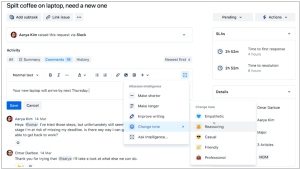
Atlassian has introduced Atlassian Intelligence, an AI-powered 'virtual teammate' that utilizes the company's proprietary models and OpenAI's large language models to create customized teamwork graphs. This technology enables various functionalities, such as AI-generated summaries in Confluence and test plans in Jira Software, as well as the rewriting of responses to customers in Jira Service Management. Atlassian Intelligence provides users with a chatbox similar to Chat-GPT, which is deeply integrated into different products and allows for the referencing of specific documents. For instance, to generate a summary of action items from a recent meeting, users can link the document with the transcript and request the summary inside Confluence. The tool then generates a list of decisions and action items from the meeting.
2021. Project management service ZenHub raises $4.7M
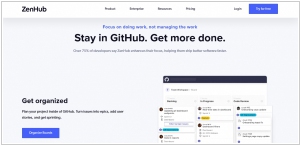
ZenHub, the project management service focused on GitHub integration for development teams, has successfully raised a seed funding round of $4.7 million. In addition to this achievement, the company has recently introduced its latest automation feature. This new feature aims to streamline the planning of development sprints, a critical aspect of the Agile development process that often consumes significant time and effort. By automating this process, teams can allocate their resources more efficiently towards actual development work. Furthermore, ZenHub has plans to develop an additional feature that automates certain aspects of the software estimation process. This upcoming tool will assist teams in assigning story points to routine action items, enabling more focused discussions on contentious issues.
2020. Atlassian acquires asset management company Mindville

Atlassian has made an announcement regarding its recent acquisition of Mindville, an enterprise asset management provider focused on Jira. This acquisition marks Atlassian's entry into a new market segment, as it adds asset management tools to its existing suite of services. Mindville Insights, the flagship product of Mindville, enables tracking of assets across various departments such as IT, HR, sales, legal, and facilities within a company. While the platform is asset-agnostic, it is expected that many companies within Atlassian's user base will utilize it primarily for tracking IT assets such as servers and laptops. In addition to physical assets, the service also supports automatic importing of cloud-based servers from providers like AWS, Azure, and GCP. The Mindville team has developed connectors to integrate with popular services like ServiceNow and Snow Software. Notable customers of Mindville include NASA, Spotify, and Samsung, among others.
2018. Jira Cloud gets Trello-inspired redesign
Earlier this year, Atlassian introduced the latest iteration of its hosted project tracking tool, Jira Software. This release signifies a significant division between the hosted version of Jira, hosted on AWS, and the self-hosted server version, with Atlassian now focusing on distinct features for each. The new version of Jira boasts a fresh, Trello-inspired interface and introduces enhanced functionality that empowers teams with a more flexible workflow, reducing reliance on administrators and granting greater autonomy. One notable feature that Atlassian takes pride in is roadmaps, which enables teams to gain a comprehensive view of their projects. Similar to boards, modifying the roadmap is effortless as it simply involves dragging and reassigning larger work segments, referred to as "epics" in Agile terminology, to different dates.
2016. JIRA gets Upwork integration
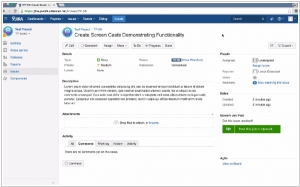
The project management service JIRA is introducing a new functionality that enables users to seamlessly convert JIRA tickets into job postings on the Upwork freelance marketplace. This integration allows JIRA users to simply click a button and access a pre-filled form to submit directly to Upwork's marketplace. This feature is particularly beneficial for small businesses that frequently face a backlog of feature requests and unresolved bug fixes. It is worth noting that this collaboration between Atlassian and Upwork is not the first time they have partnered in relation to JIRA. Upwork clients already have the ability to link their JIRA tickets to their Upwork account, enabling freelancers to track their time. Furthermore, clients can utilize Upwork's messaging feature to receive updates when a freelancer commits code to Bitbucket or updates a JIRA ticket, for instance.
2015. ZenHub connects its project management service to GitHub Enterprise
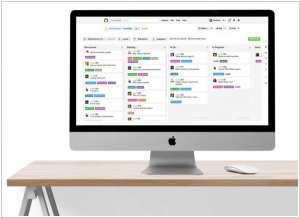
ZenHub, a platform designed to assist engineering teams in managing their GitHub projects using intuitive drag-and-drop task boards similar to Trello, was initially exclusively available for regular GitHub accounts. However, a recent development has expanded its accessibility. From now on, enterprise users who utilize the on-premise GitHub Enterprise service can also leverage the capabilities of ZenHub. This enterprise version of ZenHub distinguishes itself as one of the pioneering collaboration and project management services that seamlessly integrates with GitHub Enterprise. GitHub, along with Git as a whole, has been rapidly embraced within enterprise environments. Consequently, several project management services have emerged in the market, including startups like waffle.io (which also supports GitHub Enterprise) and various tools offered by Microsoft and Atlassian. What sets ZenHub apart is its direct integration with GitHub Enterprise, eliminating the need for developers to constantly switch between multiple disparate tools.
2014. Atlassian launches JIRA and Confluence for large companies
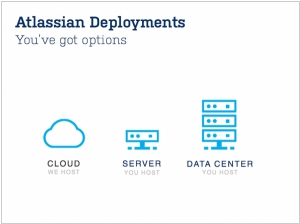
Atlassian has unveiled two new products designed specifically for large enterprises. In the upcoming week, Atlassian will release JIRA Data Center, a version of its project management software that supports running the service on multiple nodes. Additionally, later this summer, it will introduce Confluence Data Center, a collaboration service centered around wikis. With the Data Center versions, larger companies will enjoy improved support for scaling the services across multiple nodes, resulting in enhanced performance and scalability. Administrators will have the ability to route specific applications, teams, or geographies to designated nodes within a cluster, while additional nodes can be added in real time. The clustering technology and shared file systems are seamlessly integrated with industry-standard technologies, ensuring smooth operations.
2014. Zoho BugTracker adds Kanban View and Free version
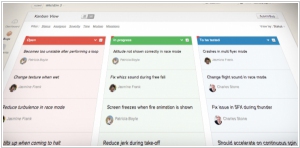
Zoho BugTracker has recently introduced two notable enhancements to its platform. The first enhancement is the Kanban View, which presents bugs as visual cards organized into different columns. Each column represents a specific bug status, such as Open, In progress, or To be tested. Users can conveniently move bugs from one column to another by dragging and dropping them, following the defined workflow. Moreover, Zoho BugTracker now offers a free subscription plan tailored for small teams. This plan includes 1 Project, 10 MB of storage space, Project Feeds, Issue Tracking, Forums and Documents, CSV import, and user management. It enables small teams to access essential features and functionalities at no cost. Additionally, Zoho BugTracker has been integrated into the free version of Zoho Projects, a project management application. This integration provides users with the combined capabilities of bug tracking and project management within a single platform, promoting collaboration and streamlining workflows.
2014. Create such video for your company
Axosoft's team comprises a group of highly skilled and imaginative individuals. They garnered considerable attention from IT bloggers yesterday with their groundbreaking announcement: setting the price of their Axosoft Bug Tracker at a mere $1 per year. This development is quite remarkable considering that only paid and free bug trackers were available on the market until now. While a bug tracker for such a nominal amount may not seem essential, what truly stands out is Axosoft's approach in creating a video for their company. Why is it important? It enables potential customers to develop a genuine fondness for the company even before making a purchase, attracts talented individuals who aspire to work there, and fosters a welcoming office environment for their employees.
2014. Redmine 2.5 impoves custom fields
Redmine, a versatile web application for project management developed using the Ruby on Rails framework, has released its latest version - Redmine 2.5.0, which is now available for download. This update brings numerous enhancements to custom fields formats, including support for text formatting, HTTP links, and more precise selection options for user and version custom fields based on roles and version status. The custom field format API has undergone a complete rewrite, so if you have any plugins that interact with it (e.g., those adding non-standard field formats), it is necessary to update them before proceeding with the upgrade. Additionally, this version introduces experimental support for Markdown formatting, a widely used syntax for text formatting.
2012. YouTrack 4.0 gets agile project management module
JetBrains has unveiled the latest release of its issue tracker and Agile project management system, YouTrack 4.0. A notable addition in YouTrack 4.0 is the introduction of a standalone Agile project management module compatible with Scrum and Kanban workflows. Other noteworthy enhancements in YouTrack 4.0 encompass Scrum and Kanban boards for efficient organization and progress tracking of project activities, backlog management for creating Product and Release backlogs to oversee features and tasks across various projects, releases, or iterations. The update also includes burndown and Cumulative flowcharts, the ability to manage multiple projects on a single board, customizable notification templates, custom reordering of any issue list, subtask support for creating subtasks associated with any issue, SSL keys management, and workflow compliance.
2011. Bugzilla 4.0 improves duplicate detection, custom fields and search
The latest version of the widely-used bug-tracker, Bugzilla 4.0, has been officially released. Since Bugzilla 3.0, significant redesigns have been implemented across almost every major user interface, resulting in a vastly improved experience. Additionally, the WebServices have undergone significant advancements, and an impressive Extensions system has been introduced, accompanied by numerous other new features. Bugzilla 4.0 introduces more than just enhanced WebService and UI functionality. Exciting additions include automatic duplicate detection, improved custom field capabilities, autocomplete functionality for user inputs, and search enhancements. Furthermore, the update brings forth a new attachment details user interface, general usability improvements, a revamped default status workflow, improved "Last Search" functionality that remembers multiple searches, cross-domain WebServices with JSONP support, mandatory custom fields, the transformation of voting into an extension, automatic provision of new CSS and Javascript to users, an array of new hooks, and a new Apache configuration.
2006. Trac - web-based project management with wiki + bug-tracker + svn code browser

Trac emerges as a fresh contender in the realm of issue tracking tools, offering a delightful web-based project management solution developed in Python. One of its key strengths lies in its seamless integration with existing Subversion repositories. With Trac, you can conveniently browse the code within your repositories, complete with syntax highlighting, and effortlessly view differences between revisions. Notably, Trac goes beyond version control integration and extends its capabilities to include a wiki feature for project documentation. Moreover, it incorporates a built-in bug tracker reminiscent of Bugzilla, resulting in a comprehensive, all-in-one software solution. It's important to note that Trac is Free Software, and although its license recently transitioned from GPL to the revised BSD license, it continues to uphold its open-source principles. To enhance Trac's functionality, you can explore a wide array of useful plugins and macros available at trac-hacks.org. These include noteworthy additions such as DoxygenPlugin, GanttPlugin, DebianBtsMacro, and many others, enabling you to tailor Trac to your specific needs and requirements. Discover the power and versatility of Trac for effective project management and issue tracking.

